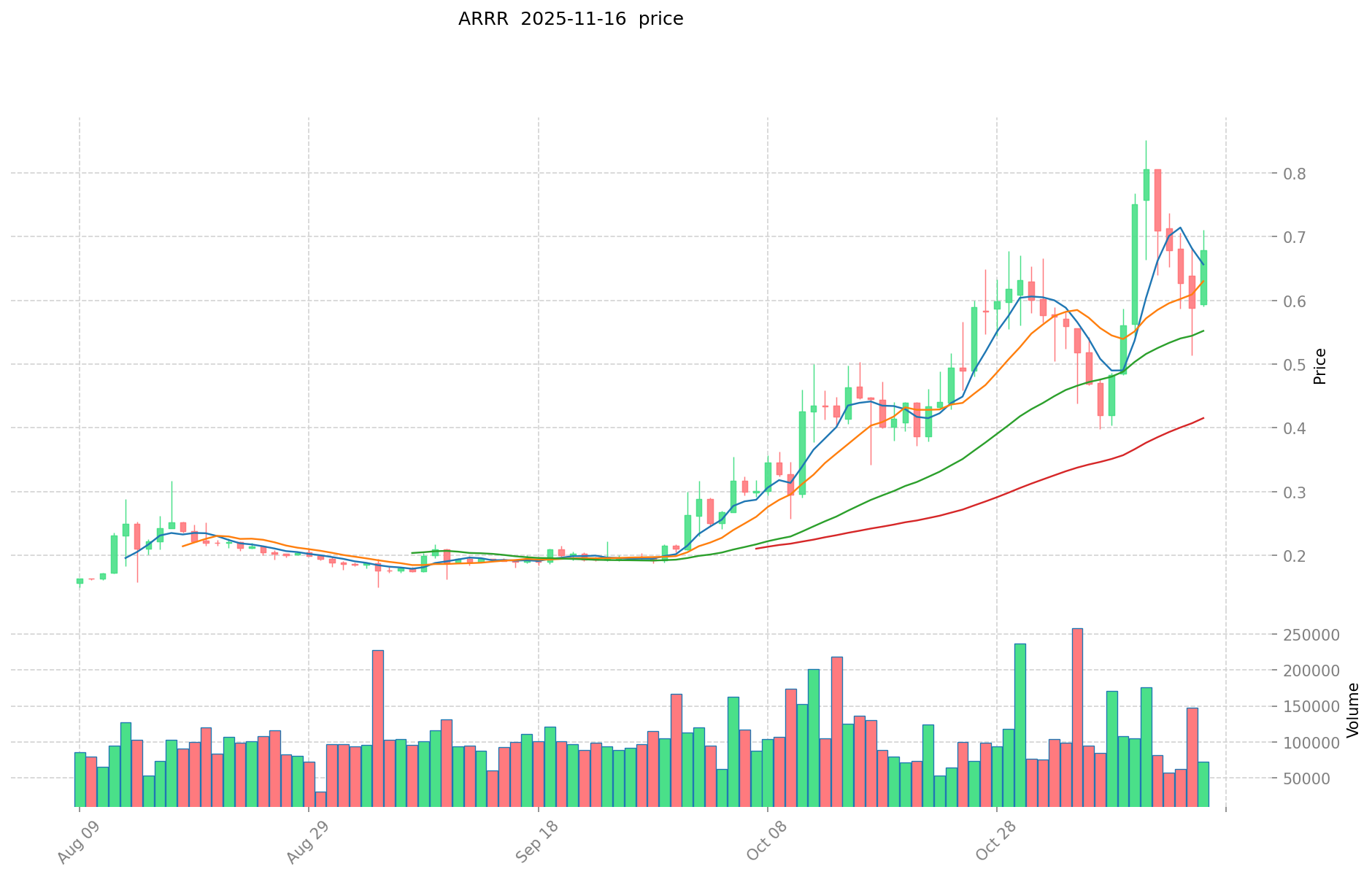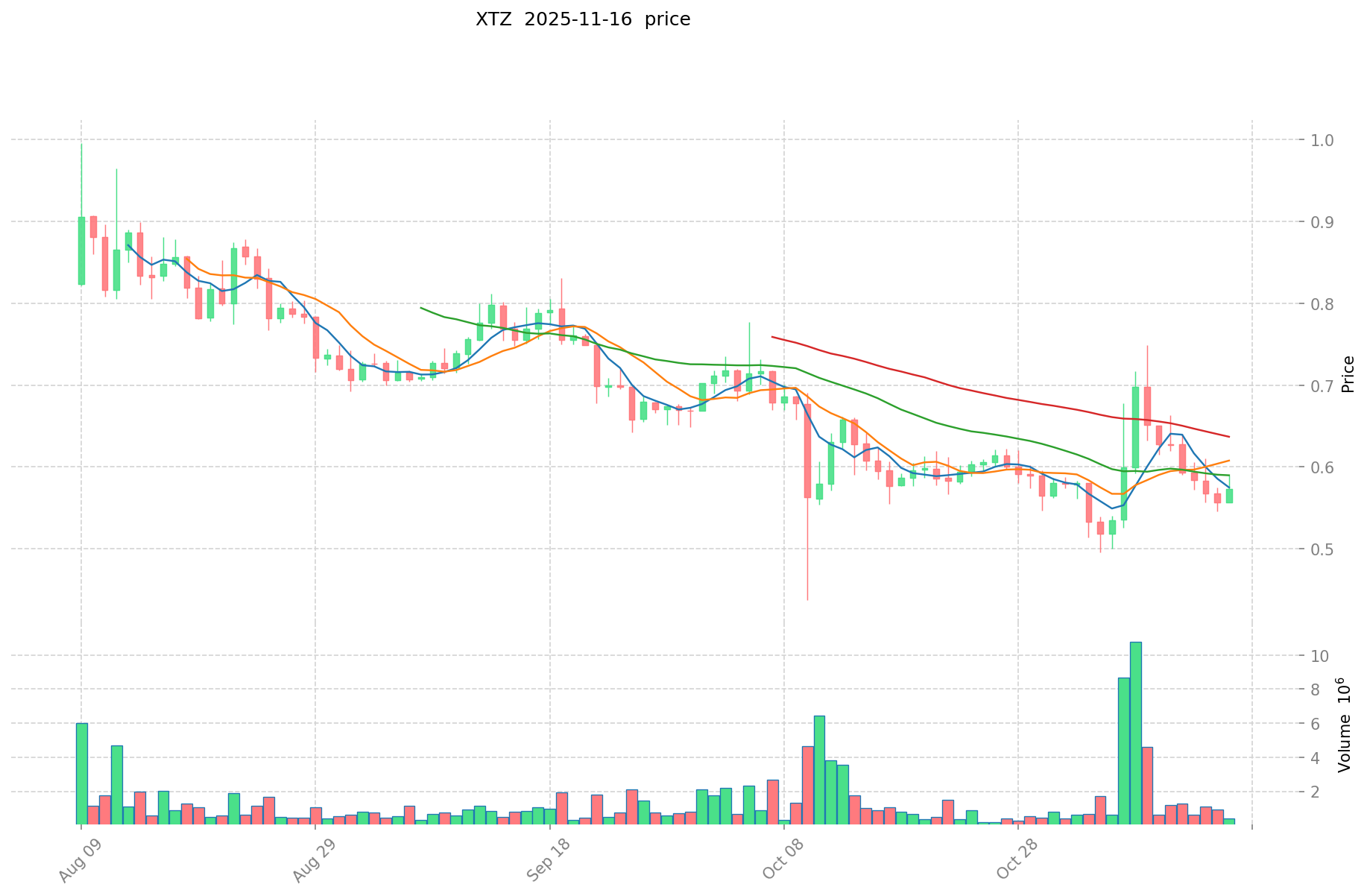ARRR vs XTZ: Comparing Privacy and Smart Contract Capabilities in Cryptocurrency Ecosystems
Introduction: Investment Comparison of ARRR vs XTZ
In the cryptocurrency market, the comparison between Pirate Chain vs Tezos has always been a topic that investors cannot avoid. The two not only have significant differences in market cap ranking, application scenarios, and price performance, but also represent different positioning in the crypto asset space.
Pirate Chain (ARRR): Since its launch in 2018, it has gained market recognition for its focus on privacy and security in cryptocurrency transactions.
Tezos (XTZ): Introduced in 2017, it has been hailed as a self-amending blockchain platform, and is one of the cryptocurrencies with significant global trading volume and market capitalization.
This article will provide a comprehensive analysis of the investment value comparison between ARRR vs XTZ, focusing on historical price trends, supply mechanisms, institutional adoption, technological ecosystems, and future predictions, attempting to answer the question that investors are most concerned about:
"Which is the better buy right now?"
I. Price History Comparison and Current Market Status
ARRR (Coin A) and XTZ (Coin B) Historical Price Trends
- 2021: ARRR reached its all-time high of $16.76 on April 24, 2021, showing significant price appreciation.
- 2021: XTZ hit its all-time high of $9.12 on October 4, 2021, demonstrating strong market performance.
- Comparative analysis: In the recent market cycle, ARRR has fallen from its high of $16.76 to a current price of $0.6797, while XTZ has declined from $9.12 to $0.5693.
Current Market Situation (2025-11-16)
- ARRR current price: $0.6797
- XTZ current price: $0.5693
- 24-hour trading volume: ARRR $33,446.42 vs XTZ $241,973.32
- Market Sentiment Index (Fear & Greed Index): 10 (Extreme Fear)
Click to view real-time prices:
- Check ARRR current price Market Price
- Check XTZ current price Market Price


II. Core Factors Affecting Investment Value of ARRR vs XTZ
Supply Mechanism Comparison (Tokenomics)
-
ARRR: Fixed maximum supply of 200 million coins with all coins expected to be mined by 2023
-
XTZ: Inflationary model with no maximum supply cap, featuring a self-amending governance system that can adjust inflation
-
📌 Historical Pattern: Limited supply cryptocurrencies like ARRR tend to experience more volatility but potentially higher appreciation during bull markets, while inflationary models like XTZ may offer more price stability but potentially less dramatic growth.
Institutional Adoption and Market Applications
- Institutional Holdings: XTZ has gained more institutional adoption with Coinbase Custody and other institutional services supporting it, while ARRR has minimal institutional presence due to its privacy focus
- Enterprise Adoption: XTZ has been implemented in various enterprise solutions including tokenization platforms and smart contract applications, while ARRR remains primarily focused on privacy-oriented individual use cases
- National Policies: Privacy coins like ARRR face increasing regulatory scrutiny with some exchanges delisting them due to regulatory pressure, while XTZ faces fewer regulatory challenges as a smart contract platform with transparent transactions
Technical Development and Ecosystem Building
- ARRR Technical Upgrades: Focuses on maintaining robust privacy features with zk-SNARKs technology and delayed-proof-of-work consensus mechanism
- XTZ Technical Development: Implements on-chain governance for protocol upgrades without hard forks and uses liquid proof-of-stake consensus allowing token holders to delegate their validation rights
- Ecosystem Comparison: XTZ has a more developed ecosystem with DeFi applications, NFT marketplaces, and enterprise solutions, while ARRR's ecosystem is more limited, focusing primarily on privacy-preserving transactions
Macroeconomic Factors and Market Cycles
- Performance in Inflationary Environments: ARRR's fixed supply model theoretically offers better inflation protection, while XTZ's inflationary model may face more challenges during high inflation periods
- Macroeconomic Monetary Policy: Interest rate hikes typically pressure both assets, but XTZ's staking rewards may partially offset this impact
- Geopolitical Factors: ARRR benefits from increased privacy demands during periods of global instability, while XTZ benefits from increased institutional adoption of blockchain solutions III. 2025-2030 Price Prediction: ARRR vs XTZ
Short-term Prediction (2025)
- ARRR: Conservative $0.47 - $0.68 | Optimistic $0.68 - $0.84
- XTZ: Conservative $0.34 - $0.57 | Optimistic $0.57 - $0.71
Mid-term Prediction (2027)
- ARRR may enter a growth phase, with prices estimated at $0.57 - $1.27
- XTZ may enter a steady growth phase, with prices estimated at $0.68 - $0.92
- Key drivers: Institutional fund inflows, ETFs, ecosystem development
Long-term Prediction (2030)
- ARRR: Base scenario $1.09 - $1.58 | Optimistic scenario $1.58 - $1.69
- XTZ: Base scenario $0.98 - $1.02 | Optimistic scenario $1.02 - $1.28
Disclaimer
ARRR:
| 年份 | 预测最高价 | 预测平均价格 | 预测最低价 | 涨跌幅 |
|---|---|---|---|---|
| 2025 | 0.840224 | 0.6776 | 0.467544 | 0 |
| 2026 | 1.13077888 | 0.758912 | 0.66784256 | 11 |
| 2027 | 1.2660928896 | 0.94484544 | 0.566907264 | 39 |
| 2028 | 1.448164605888 | 1.1054691648 | 0.66328149888 | 62 |
| 2029 | 1.87692082145568 | 1.276816885344 | 1.22574420993024 | 87 |
| 2030 | 1.687249673137828 | 1.57686885339984 | 1.088039508845889 | 131 |
XTZ:
| 年份 | 预测最高价 | 预测平均价格 | 预测最低价 | 涨跌幅 |
|---|---|---|---|---|
| 2025 | 0.71125 | 0.569 | 0.3414 | 0 |
| 2026 | 0.85136625 | 0.640125 | 0.42888375 | 12 |
| 2027 | 0.91726711875 | 0.745745625 | 0.67862851875 | 30 |
| 2028 | 0.99780764625 | 0.831506371875 | 0.4490134408125 | 46 |
| 2029 | 1.1341746912375 | 0.9146570090625 | 0.512207925075 | 60 |
| 2030 | 1.2805198126875 | 1.02441585015 | 0.983439216144 | 79 |
IV. Investment Strategy Comparison: ARRR vs XTZ
Long-term vs Short-term Investment Strategies
- ARRR: Suitable for investors focused on privacy and security features
- XTZ: Suitable for investors looking for ecosystem potential and institutional adoption
Risk Management and Asset Allocation
- Conservative investors: ARRR: 20% vs XTZ: 80%
- Aggressive investors: ARRR: 40% vs XTZ: 60%
- Hedging tools: Stablecoin allocation, options, cross-currency portfolios
V. Potential Risk Comparison
Market Risk
- ARRR: High volatility due to limited liquidity and smaller market cap
- XTZ: Subject to broader market trends and institutional sentiment
Technical Risk
- ARRR: Network stability, potential privacy vulnerabilities
- XTZ: Smart contract risks, governance-related issues
Regulatory Risk
- Global regulatory policies may have a more significant impact on ARRR due to its privacy features, while XTZ faces fewer regulatory challenges
VI. Conclusion: Which Is the Better Buy?
📌 Investment Value Summary:
- ARRR advantages: Strong privacy features, fixed supply model
- XTZ advantages: Established ecosystem, institutional adoption, self-amending blockchain
✅ Investment Advice:
- New investors: Consider a smaller allocation to ARRR for diversification, focus more on XTZ for its established ecosystem
- Experienced investors: Balance between ARRR and XTZ based on risk tolerance and privacy preferences
- Institutional investors: Primarily focus on XTZ due to its regulatory compliance and institutional-grade infrastructure
⚠️ Risk Warning: Cryptocurrency markets are highly volatile. This article does not constitute investment advice. None
VII. FAQ
Q1: What are the main differences between ARRR and XTZ? A: ARRR focuses on privacy and has a fixed supply, while XTZ is a self-amending blockchain with an inflationary model. XTZ has a more developed ecosystem and institutional adoption, whereas ARRR prioritizes individual privacy-oriented use cases.
Q2: Which coin has performed better historically? A: Both coins reached their all-time highs in 2021. ARRR peaked at $16.76 on April 24, 2021, while XTZ reached $9.12 on October 4, 2021. Since then, both have experienced significant price declines.
Q3: How do the supply mechanisms of ARRR and XTZ differ? A: ARRR has a fixed maximum supply of 200 million coins, expected to be fully mined by 2023. XTZ has an inflationary model with no maximum supply cap and features a self-amending governance system that can adjust inflation.
Q4: Which coin has better institutional adoption? A: XTZ has gained more institutional adoption, with support from Coinbase Custody and other institutional services. ARRR has minimal institutional presence due to its privacy focus and potential regulatory challenges.
Q5: What are the key technical features of each coin? A: ARRR utilizes zk-SNARKs technology for privacy and a delayed-proof-of-work consensus mechanism. XTZ implements on-chain governance for protocol upgrades and uses liquid proof-of-stake consensus.
Q6: How do the 2030 price predictions compare for ARRR and XTZ? A: For ARRR, the base scenario predicts $1.09 - $1.58, with an optimistic scenario of $1.58 - $1.69. For XTZ, the base scenario predicts $0.98 - $1.02, with an optimistic scenario of $1.02 - $1.28.
Q7: What are the main risks associated with investing in ARRR and XTZ? A: ARRR faces high volatility, limited liquidity, and potential regulatory challenges due to its privacy features. XTZ is subject to broader market trends, smart contract risks, and governance-related issues.
Q8: Which coin might be more suitable for different types of investors? A: New investors might consider a smaller allocation to ARRR and focus more on XTZ. Experienced investors could balance between the two based on risk tolerance. Institutional investors may primarily focus on XTZ due to its regulatory compliance and institutional-grade infrastructure.
Share
Content